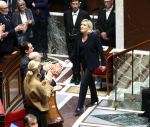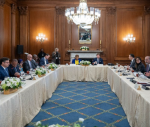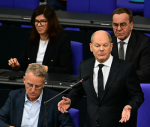You are here
Not always good
Apr 15,2014 - Last updated at Apr 15,2014
Someone who is not familiar with the Arab world would be excused if he believed that democracy is thriving in this part of the globe.
Elections are due to take place in Algeria, Iraq and Egypt. The Lebanese parliament will soon elect a new president, and even in war-torn Syria presidential elections are expected to take place in July.
The Palestinians may hold legislative and presidential elections, long overdue, before the end of the year. Similar polls should take place in Tunisia later this year.
Even the Libyans are trying to iron out their differences and hold fresh legislative elections as soon as possible. In Yemen, following the national dialogue, elections are being planned as well.
Unfortunately, the reality for most countries is not that promising. Elections and democracy are too different things, as the Algerian situation testifies.
Incumbent President Abdulaziz Bouteflika, 77 and ill, is about to secure a controversial fourth term. He has been at the helm for 15 years and in spite of opposition to his election, it looks like he will succeed.
The ruling party is clinging to power at all cost and young Algerians are growing more frustrated with the slow pace of political reforms.
In Iraq, Prime Minister Nouri Al Maliki is trying to win a third term in spite of sectarian and ethnic divisions, and wide criticism of his authoritarian rule and intervention in the legislative and judicial branches of government.
Maliki used his powers to hunt down political opponents while the country is being ripped apart by terrorism.
The Kurds are talking about independence from Iraq while the Sunnis complain about a conspiracy to prevent them from participating in the polls and deprive them of a power-sharing deal.
The security situation in the Anbar province is proof that Maliki is seeking to exclude the Sunni tribes from the political process.
In Egypt, the result of the presidential elections next month is a foregone conclusion with the majority of Egyptians backing former defence minister Abdel Fattah Al Sisi. But Egyptians’ hopes that Sisi will be the answer to the country’s complicated problems and challenges may be dashed. Already there are signs that Egypt is reverting to a police state amid intensifying security threats.
The current showdown with the Muslim Brotherhood will drag on for years and eventually political reconciliation with moderate forces will be needed.
One thing appears clear: The lofty goals of the January 25 uprising have been forgotten. Egypt’s path towards stability and recovery will be long and hard.
On the other hand, Syria’s Bashar Assad is clinging to power by all means.
As the civil war enters its fourth year, there are no indications that the killings and destruction will end soon. Still, Assad wants to run for elections to win a third term.
The country is divided and millions of Syrians are displaced. It is clear that the poll will not be fair or free. Assad’s re-election will dash any hope of a political settlement to the crisis that has claimed at least 150,000 lives.
Palestinian President Mahmoud Abbas needs to bolster his legitimacy among his people and the rest of the world.
His term has expired many years ago, but the absence of reconciliation with Hamas in Gaza hindered attempts to hold fresh presidential and legislative elections.
With the peace process in tatters, Abbas may try to hold elections in the West Bank only. This will underline Gaza’s separation and isolation.
A last-minute attempt to reach reconciliation now depends on regional factors as well.
There is a glimmer of hope for Tunisia, where a progressive constitution was adopted recently.
The Islamist movement there has shown maturity and responsibility by compromising on many controversial issues. Still, differences exist between various political parties, and while the plan is to hold presidential and legislative elections this year, consensus may be difficult to attain.
Libyans, too, are trying to work out differences three years after the fall of the Qadhafi regime.
The central government is weak and armed groups control vital regions while the oil-rich region of Burqa is demanding autonomy from Tripoli.
The national congress has not been able to elect a government whose priority would be to pave the way for new elections.
In every Arab country where elections are expected, challenges exist, proving again that democracy is struggling and that Arab people’s aspiration for freedom, social justice and human dignity remains elusive.
Four years after the Arab Spring, conditions have not improved, and in many cases they are worse. Democracy is a cultural trait first, and the ballot box is not always proof of its existence.
The writer is a journalist and political commentator based in Amman.













